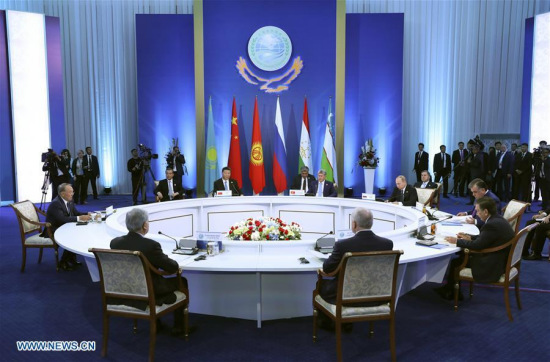
Chinese President Xi Jinping attends a small-range meeting during the 17th meeting of Council of Heads of State of the Shanghai Cooperation Organization (SCO) in Astana, Kazakhstan, June 9, 2017. (Xinhua/Pang Xinglei)
The Shanghai Cooperation Organization's (SCO) first-ever membership expansion demonstrated its strategic value in boosting international security and common development, officials and experts have said.
With the accession of India and Pakistan at the 17th SCO summit in Astana, the SCO covers three-fifths of Eurasia, and has nearly half the world population.
As a driving force in regional security and stability, the SCO has made security cooperation a priority since its founding in 2001. The expansion will improve its potential for cooperation and representation and boost international security and stability.
"The expansion is a historic moment for the SCO and relations between Eurasian countries," Dmitry Mezentsev, former secretary general of the SCO, told Xinhua.
Mezentsev said it would produce far-reaching influence for the international agenda, vigorously boost international security and stability and help resolve problems in the Eurasian region.
Under the "Shanghai Spirit" of mutual trust, mutual benefit, equality, consultation, respect for cultural diversity and pursuit of common development, the SCO has made remarkable achievements in battling terrorism, extremism and separatism.
"The SCO has played an exemplary role in building a new type of international relations featuring win-win cooperation over the past 16 years since its founding," said Sun Zhuangzhi, secretary-general of the SCO Research Center affiliated to the Chinese Academy of Social Sciences.
Sun's remarks were echoed by Jiang Yi, a researcher with the Institute of Russian, Eastern European, Central Asian Studies under the Chinese Academy of Social Sciences, saying that the SCO had taken the lead in building new international relations, particular in resolving deep-rooted historical problems and creating a new consensus.
"The SCO expansion indicates that the 'Shanghai Spirit' has been recognized by more and more countries and that it has a bigger appeal in regional cooperation," Jiang said.
Noting that Pakistan is located at a strategic position along the Belt and Road, while India is one the fastest growing economies in the world, Jiang said the expansion came at the right time, with southern Asian countries looking to tackle terrorism.
China, as a staunch supporter and facilitator of the SCO framework, has played a positive role in the development of the mechanism.
Currently, China is committed to building a new type of international relation featuring win-win cooperation. The Belt and Road Initiative has engaged more than 100 countries and international organizations since it was proposed in 2013 and has already made great progress.
The initiative aims to build a trade and infrastructure network connecting Asia with Europe and Africa along and beyond the ancient Silk Road trade routes.
Meanwhile, China invested a total of 51.1 billion U.S. dollars in Belt and Road countries from autumn 2013 to July 2016, accounting for 12 percent of its total outbound direct investment.
Security and stability are the basis of economic cooperation among SCO member states, Jiang noted, adding that SCO expansion would help the alignment of China's Belt and Road Initiative with the development strategies of other SCO member states.
As China assumes the SCO rotating presidency after the Astana summit, Jiang said that further development of the SCO would be conducive to establishing a fairer and more reasonable international order.
Before the accession of India and Pakistan, the SCO covered China, Russia, Kazakhstan, Kyrgyzstan, Tajikistan and Uzbekistan.


















































